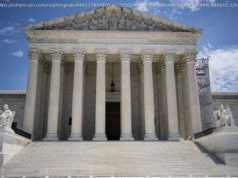The Supreme Court ruled Thursday that states now have the power to force online retailers to collect sales tax in states where they do not have a physical presence, reversing a ruling from 1992 in a 5-4 decision.
Small business advocates largely grumbled after the nation’s highest court overturned a decades-old decision on online sales tax.
The Supreme Court ruled Thursday that states now have the power to force online retailers to collect sales tax in states where they do not have a physical presence, reversing a ruling from 1992 in a 5-4 decision. The move also revives a 2016 South Dakota law that required large, out-of-state e-commerce companies to collect sales tax, one that big e-commerce players fought. Some online retailers, such as Amazon.com, currently collect state sales tax on products they directly sell but do not collect taxes from many of the independent sellers on the site.
The decision removes the sales-tax savings that consumers could reap by making purchases online instead of buying from local brick-and-mortar shops. Although the move does help to level the playing field for physical small businesses, it also places new burdens on small online retailers.
Some small business groups argue the decision will be burdensome and add to an already confusing tax structure. The nonpartisan Small Business & Entrepreneurship Council said the ruling will add stress for small businesses, the marketplace and internet entrepreneurs.
« It creates uncertainty, havoc, vast new costs and unknown exposure for small businesses, » council CEO Karen Kerrigan said in a statement. « The fact that small businesses must now act as tax collectors for thousands of separate state and local [jurisdictions] is outrageous. »
Kerrigan called on Congress to clarify the decision.
Tax policy is often cited as a top issue for Main Street. In fact, the National Federation of Independent Business, a conservative lobbying group, says taxes are a top-three issue for its membership. The nonpartisan National Small Business Association also finds taxes are a top priority for its membership.
« Easing complexity is paramount, » said Molly Day, a National Small Business Association spokeswoman, adding that simplification should be « a priority when it comes to state sales taxes. »
While the group admitted that traditional Main Street retailers selling in physical stores may benefit from the Supreme Court ruling, it noted that the complexity of the decision will hurt those selling across state lines.
« This decision will help local ‘brick-and-mortar’ stores with a more level playing field with their online retailing competitors. However, it could be a significant blow both in direct costs and added complexity to retailers selling across state lines, many of which are smaller companies, » Day said. « Unfortunately, this ruling makes sweeping changes to sales tax law, but provides nothing in the form of easing complexity and/or streamlining each states’ processes. »






